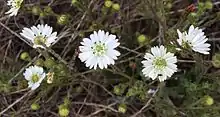Hemizonia congesta
Hemizonia congesta, known by the common name hayfield tarweed, is a species of flowering plant in the daisy family, native to western North America.
| Hemizonia congesta | |
|---|---|
.jpg.webp) | |
| Scientific classification | |
| Kingdom: | |
| (unranked): | |
| (unranked): | |
| (unranked): | |
| Order: | |
| Family: | |
| Subfamily: | |
| Tribe: | |
| Genus: | |
| Species: | H. congesta |
| Binomial name | |
| Hemizonia congesta | |

Range
Hemizonia congesta is native to California and Oregon, where it is a common member of the flora of a number of habitats, particularly in grasslands and fields.[1] It is a native plant in the Central Valley (California), and the California Coast Ranges.
Description
Hemizonia congesta is a spindly, thin-stemmed annual herb growing erect to 10–80 centimetres (3.9–31.5 in) in height. Like other tarweeds the stem and foliage are glandular and have an odor reminiscent of tar. Most of the long, narrow, pointed leaves are located on the lower portion of the stem below the branching flower stalks.
The inflorescences are covered in glandular hairs and hold daisylike flower heads. Each head has a center of yellowish dark-tipped disc florets and a fringe of bright yellow to white ray florets, often with purplish striping on the undersides. The ray florets are toothed or lobed on the tips, with the middle tooth thinner than the others.
Subspecies
There are many Hemizonia congesta subspecies, which can vary in appearance. They include:
- Hemizonia congesta subsp. calyculata — Mendocino tarplant [2]
- Hemizonia congesta subsp. clevelandii [3]
- Hemizonia congesta subsp. congesta [4]
- Hemizonia congesta subsp. leucocephala — hayfield tarplant [5]
- Hemizonia congesta subsp. luzulifolia [6]
- Hemizonia congesta subsp. tracyi — Tracy's tarplant [7]
External links
- Calflora Database: Hemizonia congesta (Hayfield tarweed)
- Jepson Manual eFlora (TJM2) treatment: Hemizonia congesta
- USDA Plants Profile: Hemizonia congesta (Hayfield tarweed)
- Hemizonia congesta — U.C. Photo gallery
| Wikimedia Commons has media related to Hemizonia congesta. |